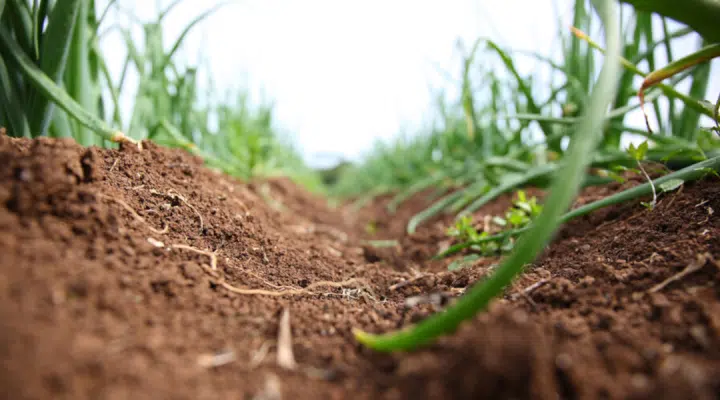Read in
FAO’s Global Soils Doctors Programme trains farmers to diagnose and heal soils
A visit to the doctor often begins with a stethoscope to assess the heart and lungs because before you treat someone, you need to know how they are. Similarly, to guarantee healthy soils for sustainable agriculture and food production, you first need to know their condition.
Soils are the starting point of food and agriculture. Without healthy soils to provide nutrients, water and air for plant growth and development, we cannot grow the nutritious food we need to lead healthy lives.
Yet, soil degradation is a global problem. Currently, around one third of the world’s soils is degraded. The situation will continue to worsen if we do not take action.
FAO’s Global Soil Doctors Programme started to do just that – assessing the condition of soils and guiding farmers in remedying soil problems. The educational material and training modules from this programme help farmers to stay vigilant and responsive to soil health, a vital component of their livelihoods.
Implemented by FAO as part of the Global Soil Partnership (GSP), the Soil Doctors programme provides a space for learning, interaction and dialogue between different actors concerned about the proper use and conservation of soils. In addition to sharing diagnostic tools for soil health and implementing practices that avoid soil degradation, this initiative enhances agricultural outputs and consequently, increases nutritious produce and farmers’ incomes.
In collaboration with national partner institutions, extension services or academia, that work as “promoters” for the programme, FAO is helping to educate, train and support local farmers to manage their soil better.
Champion farmers enrolled and trained in the programme become “certified” as soil doctors, teaching others about these practices and helping their communities to safeguard this vital resource.
Meet some of the soil doctors worldwide:
Jose Luis Camacho Flores in Mexico
Jose Luis Camacho Flores, a soil doctor from Mexico City, is one of the farmers who joined this programme to learn about the importance of sustainable soil management practices for his farming.
There is a critical situation in Mexico because at least half of the soils are degraded, one of the main causes being unsustainable agricultural practices. To address the intensive use of this resource, the GSP is helping farmers restore soils in Mexico by providing them with tools and knowledge to manage soils sustainably.
Jose Luis explains that they learned how to use simple tools to evaluate soil condition. This practical approach can be easily shared farmer-to-farmer, thus improving uptake on a larger scale.
The fact that it is farmers training fellow farmers of a similar culture and background is what makes the programme a success, in Jose Luis’s view. He believes there is more acceptance of and trust in this process. Jose Luis and many other soil doctors now consider themselves responsible for the dissemination of information on sustainable soil management within their local communities, especially to young farmers. Young people who may not previously be interested in soils can see the practical applications of soil management and become more actively involved in protecting soils.
Moussa Ouedraogo in Burkina Faso
In Ouahigouya, a town in northeast Burkina Faso, Moussa Ouedraogo runs a vegetable farm with three workers. He grows tomatoes, potatoes and green beans in crop rotation with maize and legumes.
Over the past several years, he noticed that the soil responds differently depending on their treatment. “In the past, we didn’t need to apply fertilizer to produce,” he explains. Instead, the soils were more fertile because they used mulching, a technique where they cover the soil with residual crops and grasses to protect it. Nowadays, they have animals, which are a valuable addition, but this means there are fewer residues to use as mulch.
To maintain the soil’s ability to produce high quality, nutritious vegetables, they needed to find a new way of protecting soil fertility. Through the programme, Moussa learned that alternating crops and planting legumes is the solution for this. He continues to learn how to better protect his soils so that he can grow healthy and nutritious produce in his market garden.
Faruk Bhuiyan in Bangladesh
On the other side of the world is another soil doctor applying the programme’s knowledge and methods to his farm. Faruk Bhuiyan farms rice in Chandina, in the Cumilla District of Bangladesh. He explains that the old farming methods have resulted in nutrient-depleted soils and reduced nutritious quality of the food. However, with the assistance from the Soil Doctors Programme, he is using improved cultivation methods, such as micronutrient spraying, to supplement standard fertilization plans and is learning about nutrient management.
Faruk hopes that healthy soils reduce malnutrition in the future. He understands that micronutrient deficiencies are prevalent in the country and with better nutrient management and soil management practices, he can contribute to providing healthy and nutritious food for the community.
Soil Doctors worldwide
Already implemented in nine countries, the Soil Doctors programme currently has 3 475 farmers participating with 403 already certified as Soil Doctors.
As more promoters and farmers join this programme, the world is making greater strides to ensure sustainable soil management whilst simultaneously enhancing agricultural yields and incomes for farmers.



